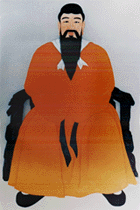

At that time a bear and a tiger living in the same cave
prayed to Holy Hwanung to transform them into human beings.
The king gave them a bundle of sacred mugworts and twenty
cloves of garlic and said, "If you eat these and shun the
sunlight for one hundred days, you will assume human form."
Both animals ate the spices and avoided the sun. After
twenty-one days the bear became a woman, but the tiger,
unable to observe the taboo, remained a tiger. Unable to
find a husband, the bear-woman prayed under the alter tree
for a child. Hwanung metamorphosed himself, lay with her,
and begot a son called Tangun Wangg˘m.
In the fiftieth year of the reign of Emperor Yao,
Tangun made the walled city of P'y˘ngyang the capital
and called his country Chos˘n in 2333 BC. He then moved his
capital to Asadal on Mount Paegak, also named Mount Kunghol,
whence he ruled for fifteen hundred years. When, in the
year kimyo [1122 BC], King Wu of Chou enfeoffed Chi
Tzu to Chos˘n, Tangun moved to Changdangy˘ng,
but later he returned and hid in Asadal as a mountain god at
the age of one thousand nine hundred and eight.
Although the Tan'gun legend is only a myth, it not only contains many significant historical facts, but it reflects the ideals of the Koreans as it helped them to develop a pride of being the people of a long history and ancient culture. Because of this, the Koreans preserve the legend which became the source of spiritual reawakening and solace in times of racial and national crisis.